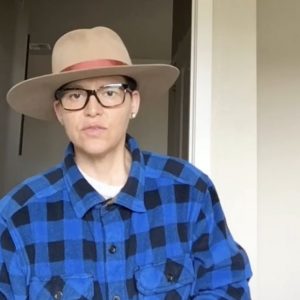Bernhardt named Fort Collins Poet Laureate
Joshua Zaffos
Water law attorney. Professor of indigenous cultures and environmental justice. Cattle wrangler. Autumn Bernhardt’s professional career has been diverse and distinguished, and now she adds another accolade: Poet Laureate of Fort Collins. Bernhardt earned the title, bestowed by Wolverine Farm Letterpress and recognizing the region’s leading literary voices, through a public vote this summer. She will carry the title for the next two years and host monthly workshops, readings, and other community events as part of her service as city Poet Laureate. (Read one of her poems below.)

“Although I have been writing and publishing poetry for a while, I was both surprised and honored to have been chosen as Fort Collins Poet Laureate for 2020-2022,” said Bernhardt. “I am grateful to all my friends and colleagues that sat down and wrote with me for hours on end, shared my writing with folks that they knew, and otherwise offered me with encouragement and inspiration over the years.”
Bernhardt teaches indigenous culture in the Department of Anthropology and Geography as well as other social and environmental justice courses at Colorado State University. In addition to academic and literary work, Bernhardt ran a crossbreed Longhorn cattle operation for 8 years. She holds a juris doctorate from the University of Colorado Law School, is a former judicial law clerk, and served as a Tribal Attorney for the White Mountain Apache Tribe. During her law career, she has also worked on behalf of Colorado River Basin tribes and as a Colorado Assistant Attorney General, where she was lead counsel in U.S. Supreme Court litigation relating to a three-state water compact dispute.
Her poetry, photography, and short stories have appeared in three books, including Grazing the Fire, Bawaajigan, and Blood, Water, Wind, & Stone. Literary journals, including the Tulane Journal of Law & Sexuality, Prism International, Yellow Medicine Review, The Moon Magazine, Red Rising Magazine, and other notable publications, have featured her work.
“In addition to its ability to comfort and inspire, poetry has always played an essential role in narrating the stories of the underrepresented, as well as the misrepresented,” said Bernhardt. “Pretty words are nice and certainly valuable, but good poetry to me has always had some element of difficult truth and subtle humor.”
Bernhardt is still determining how workshops and readings will happen during COVID-19 when physical events are discouraged. “Poetry gatherings will be quite a bit different than they were in the past due to COVID-19,” Bernhardt said, “but I look forward to engaging with my own poetry, as well as the poetry of others, in new ways as we go forward. It seems like poetry was one of the first disciplines to adapt and reflect the changes in American culture that the pandemic brought.”
She is also currently working on a chapter on native water justice for the forthcoming book, Vision & Place, and a literary piece to be published in a book anthology of international writers.
“As Poet Laureate of Fort Collins, I plan to highlight poetry’s capacity to further cultural expression and sense of place,” Bernhardt said, “and thereby serve as a profound instrument of justice.”
Manifest Destiny this week
By Autumn Bernhardt
Manifest Destiny this week
is not transcontinental railroads,
rain following the plow,
or buffalo on the prairie without hides.
Manifest Destiny this week
is pipelines under the river
through burial grounds
without free, prior, and informed consent.
Manifest Destiny this week
is not benevolent imperialism,
the yeoman farmer that came and went,
the American dream, the pastoral idyllic.
Manifest Destiny this week
is a Town Hall meeting.
Citizens of a peaceful valley
listening rather than speaking about
inevitable designs for their land.
Wilderness became open range,
open range became gardens of Eden in deserts,
farms became boxes.
The land and those connected to it lost.
Manifest Destiny this week
is not a blonde angel trumpeting
the Fall of the American wilderness as Jericho,
a blonde angel pointing a providential finger toward the Pacific.
Manifest Destiny this week
is deafened ears.
The sign saying:
Thank you for being patient
while we build a better universe
for you.
Manifest destiny this week
is not doctrines of discovery,
treaties by conquest,
conquest by divine appointment.
Manifest Destiny this week
are the gods unembarrassed by riches
explaining to the rest of us how the world works
in terms and tones reserved for children stories.
Manifest Destiny this week
is a story about meaningful consultation
branded upon bodies
implying consent from unknowing silence.
Expediency justifies not asking a question.
Permission takes too long, of course,
and after all that courtesy you might not get the answer
you want or think you deserve.
The sense of destiny
replaces the sense of place,
replaces the sense of wonder,
replaces common sense.
Manifest Destiny this week
is the same
as
it always was.
“Manifest Destiny this week” was originally published by The Moon Magazine in the Indigenous Wisdom Speaks Issue (2017).